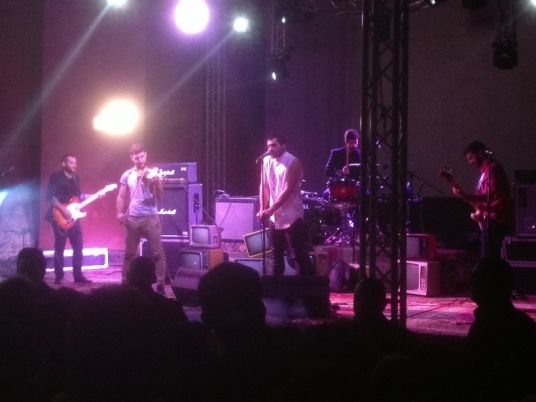
Last Thursday, Egyptian fans welcomed the indie Lebanese pop band, Mashrou’ Leila, with open arms to Alexandria for two back-to-back concerts.
The group, hailing from Beirut, is known for its unique style, poetic lyrics and daringness to take on major societal issues, and has developed a large following here in Egypt.
The band released their third album “Raasuk,” or “make you dance,” earlier this year, seemingly having perfected their musical grace as their popularity continues to grow.
The band’s choice of words can sometimes draws gasps from listeners in this conservative society. “I remember the first song I heard of theirs, ‘3al 7ajiz,’ I got shocked because it was the first time I heard a swear word in an Arabic song,” says Mohamed Hamdy Akl, 29, a fan from Cairo.
With their charged lyrics, the group has also brought another kind of controversy to center stage in the Middle East. The group’s lead vocalist, Hamed Sinno, is also arguably the first openly gay Arab singer. Homosexuality is still a social taboo in Egypt, where police have lately stepped up raids on public gatherings of homosexuals, arresting dozens.
Some Egyptians looked disapprovingly at Mashrou’ Leila’s appearance on CBC’s Al-Bernameg, the popular late night TV show hosted by Bassem Youssef that mixed politics and comedy, which has since been shut down. Youssef was accused of insulting religion for allowing a gay singer to perform on his show.
“These kind of things are against Egyptian and religious traditions,” explains Hamdy Akl. “I guess Bassem did it because it’s a new trend of music in Egypt. For a long time Egyptian musician have been only interested in love, passion and this kind of stuff but now we gave the lyrics that really shows our suffering, both politically and socially.”
The controversy, however, hasn’t stopped the band from inspiring a new generation of Egyptians who feel the music was perhaps written especially for them. One of the many signs held up during the concert in Alexandria, was an LGTBQ sign, professing fandom for Sinno.
Fatma Reda, 18, from Cairo describes herself as a big fan of the group. She is even known to occasionally doodle Sinno’s portrait in her math homework. After posting her doodle on Twitter, Sinno responded to her tweet: “you call that a doodle?! I’m scared to ask what your actual drawings look like.”
Reda says she respects Mashrou’ Leila and finds them incredibly inspiring. “Making it in the music world is not that easy, let alone when you don’t have a production company but despite that, despite some people’s homophobia, despite censorship, they still made it. They still succeeded,” she says.
Although the band declined to be interviewed by Egypt Independent, as they voiced their wishes to only speak about music, the political aspect of their lyrics are precisely what attracts so many Egyptian fans to the group.
“They don’t only make beautiful songs about love,” Reda says. “They say things that need to be said and heard by the people. ”
Reda stresses that she loves the band for the meaning behind the songs as it shows they are not just trying to make money, but send a political message. “The meaning behind each line is controversial and that takes a lot of courage to do, especially in the Middle East,” she adds.
The song “We Nueid” gives special meaning to Reda as she feels the story fits Egypt perfectly. The lyrics describe a people doomed to repeat the same motions over and over again in the hopes that eventually their struggle will pay off. “We refuse to eat each other, even if people can see our bones. Tell them we’re not hungry,” the song reads.
“We all remember how Christians and Muslims protected each other during the demonstrations yet a lot of the media was all about sectarian violence in Egypt,” Fatma explains. “No matter how governments mess up and no matter how misleading the media is, the people are still people.”
The song clearly references the Arab uprising, mentioning the people shaking their cage until it falls and bearing winter in hopes of spring.
Hamdy Akl says the most popular song on the third album “Lel Watan,” or “for the country,” closely mirrors political dynamics in Egypt.
The song is about a people who try to hold their leaders accountable for problems in the country, but each time they ask, their inquiries are reflected by repetitive conspiracy theories and accusations of treachery.
The song concludes with the people being told to ignore their problems and dance, a metaphor for surrendering to the political games. “They tell you to stop frowning, and dance to the tune. Why the long face? Dance with me a little,” the lyrics read.
Though fans were ecstatic to have their favorite band visit Egypt, many were left wondering why the group apparently snubbed Cairo, choosing a one-day appearance in Alexandria. Perhaps the coastal city simply has a special place in Sinno's heart, as he endearingly referred to it as “Lexy.”
